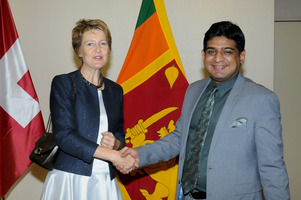
Federal Councillor Simonetta Sommaruga, Head of the Federal Department of Justice and Police of the Swiss Confederation undertook a three-day visit to Sri Lanka, during which she called on President Maithripala Sirisena and Prime Minister Ranil Wickremesinghe.
The main highlight of the visit was the signing of a Memorandum of Understanding between the Government of Sri Lanka and the Swiss Confederation on the establishment of a Migration Partnership.
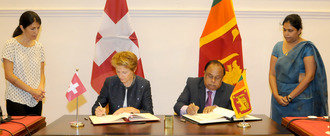
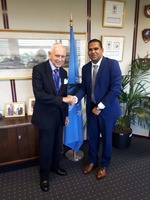
Minister of Telecommunication, Digital Infrastructure and Foreign Employment, Hon. Harin Fernando, emphasised that the Government of Sri Lanka accorded priority to increasing foreign employment opportunities for Sri Lankans in semi-skilled and skilled categories, with a clear focus on diversification of labour markets. The Minister particularly highlighted the long-term productive contributions made by Sri Lankan labour migrants to the growth of Sri Lanka’s economy.
Minister Harin Fernando made these remarks during a meeting with Ambassador William Lacy Swing, the Director General of International Organization for Migration (IOM) and senior officials of IOM yesterday, 19 July 2018, in Geneva.
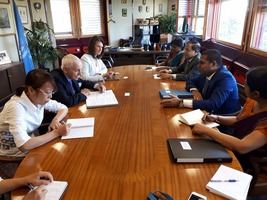
The IOM Director General thanked the Minister for the excellent bilateral cooperation between Sri Lanka and the IOM and conveyed his appreciation for Sri Lanka’s leadership of Abu Dhabi Dialogue (ADD) and its contribution and stewardship in the recent past, of the Colombo Process (CP). Director General Swing stressed that these regional processes as well as other initiatives such as migrant health, migration governance, once they were combined and harnessed into practical and cooperative programmes, could help many countries to leverage migration for development gains. He encouraged Sri Lanka to continue to be active in these areas.
An Interview given by Mr Saliya Pieris, Chairperson of the Office on Missing Persons (OMP) to the " 99 minutes" Programme of the Rupavahini channel could be accessed via following URL:
Public Communications Division
Ministry of Foreign Affairs
Colombo
12 July 2018

Unveiling a painting in honour of the late Lakshman Kadirgamar at the World Intellectual Property Organization (WIPO) in Geneva today (21 June), Hon. Liam Fox, the Secretary of State for International Trade of the United Kingdom, said that he hoped the painting would prompt the future generations and the staff of WIPO to learn from the legacy of the late Minister of Foreign Affairs of Sri Lanka, “who served and will continue to serve as an example to us all”. He made these remarks addressing a gathering of invitees including senior officials of international organizations and diplomats, in commemorating the life of the late Kadirgamar.
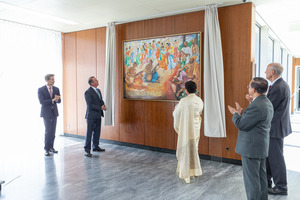
The painting gifted to WIPO by Mrs. Suganthi Kadirgamar, the late Minister's spouse is one of the masterpieces of renowned Sri Lankan painter Mr. Stanley Kirinde, depicting ‘Guttila the Veena Player’ – a historical poetic narrative of 'intellectual property and copy rights on music'. The ceremony was organized under the patronage of Dr. Francis Gurry, the Director General of WIPO.
The attention of the Ministry of Foreign Affairs has been drawn to a list of names published online by the ITJP (International Truth and Justice Project). According to the ITJP, this list, which presently consists of 351 names and can be accessed at http://www.disappearance.itjpsl.com/#lang=english is of persons who are alleged to have disappeared while in the custody of the Sri Lankan Armed Forces in May 2009.
The Office on Missing Persons (OMP) which has been established by an Act of Parliament (Act No. 14 of 2016 as amended by Act No. 09 of 2017) is the permanent and independent entity in Sri Lanka that is vested with the tasks of, inter alia, searching and tracing of missing persons and clarifying the circumstances in which such persons went missing, and their fate; making recommendations to the relevant authorities towards reducing the incidents of missing persons; protecting the rights and interests of missing persons and their relatives; and identifying proper avenues of redress to which such missing persons or their relatives may have recourse.
Therefore, the Ministry of Foreign Affairs urges and encourages anyone in Sri Lanka or overseas to kindly share with the Office on Missing Persons:
-any further/additional/detailed information pertaining to persons whose names have been listed by the ITJP and the circumstances under which they went missing;
-any other lists/information that may be available with anyone/ entity pertaining to any individuals including lists of security forces and police personnel, who may be considered to be missing, as defined by Section 27 of the Act.
Kindly direct any information available to:
Chairperson,
Office on Missing Persons,
Address: 34, Narahenpita Road, Nawala, Sri Lanka
E-mail: <ompsrilanka@gmail.com>;
Ministry of Foreign Affairs of Sri Lanka
Colombo 1
20 June 2018
[1]http://www.parliament.lk/uploads/acts/gbills/english/6016.pdf
http://www.parliament.lk/uploads/acts/gbills/english/6045.pdf
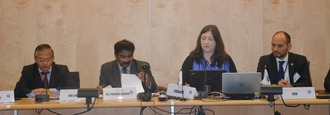
Addressing the forum on ‘individualized approach’ on the sidelines of the Intersessional Meeting of the Anti-Personnel Mine Ban Convention today, Sri Lanka Permanent Representative Ambassador Azeez recounted how Sri Lanka achieved success in what was considered a perilous task in 2009.
Ambassador Azeez highlighted Sri Lanka’s engagement in demining activity as one which had its own complexity and uniqueness. The National Policy on Reconciliation and Co-existence, in place in Sri Lanka since 2017, both underpinned and nourished the ongoing programmes of peacebuilding and development in the country, he stressed.
The Sri Lanka delegation to the Intersessional Meeting that took place in Geneva from 7-8 June, was led by P. Suresh, Secretary to the Ministry of Resettlement, Rehabilitation, Northern Development and Hindu Religious Affairs and Director of the National Mine Action Centre. Delivering a national statement at the Intersessional Meeting, he thanked the partner countries and partner organizations for the assistance provided for Sri Lanka Mine Action Programme, which he stated was expected to be completed by 2020.
Statement delivered by Ambassador Azeez
Permanent Mission of Sri Lanka
Geneva
8 June 2018

'Sustained, inclusive and sustainable growth' could hardly be realized without properly addressing the inequalities in the world of work', stated the Minister of Labour and Trade Union Relations Hon. Ravindra Samaraweera, today, 4th June 2018, speaking at the Plenary Meeting of the 107th Session of the International Labour Conference (ILC) being held in Geneva from 28 May - 9 June 2018.

Highlighting some of the significant achievements made by Sri Lanka in the field of labour, Minister Samaraweera observed that being the first country in the world to implement a National Decent Work Plan on par with ILO principles, Sri Lanka has also given priority to 'labour rights', through its inclusion in the National Human Rights Action Plan 2017-2021. He added further that Sri Lanka is in the process of introducing a 'single employment law', consolidating disparate laws that currently exist, and giving effect to the principle of non-discrimination. Sri Lanka, the Minister stressed, has also made strides in progress toward eliminating child labour, and promoting the rights of the child, offering to share its expertise in this area to support the endeavours of the ILO.
